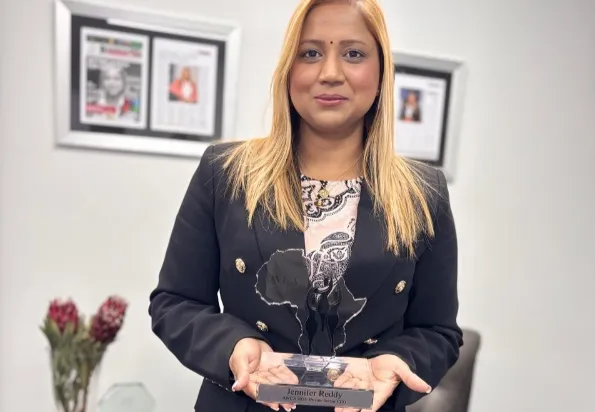'I learnt to speak up': The significance of being celebrated as a leading woman CEO
Award

Jennifer Reddy with her award
Image: Supplied
Being recognised as a top woman CEO is not just a badge of honour; it's a powerful testament to perseverance, innovation, and leadership. It symbolises breaking barriers in a traditionally male-dominated arena, showcasing the strength and resilience of women in business. This recognition not only highlights personal achievement but also inspires future generations of female leaders to pursue their dreams fearlessly and redefine what success looks like. It's a celebration of vision, determination, and the shared commitment to create a more inclusive corporate world, writes Jennifer Reddy
ON AUGUST 6, 2025, I found myself alone in my hotel room at the Taj Amer Hotel in Jaipur, once again away from home on business. I received a WhatsApp video announcing that I had been named the Private Sector CEO of the Year 2025 by the African Women Chartered Accountants Forum of South Africa (AWCA). I had never imagined I would receive such an honour.
Overwhelmed with emotion, I sat on the bed and watched the video more than 20 times, tears in my eyes. It prompted me to reflect on my journey to this moment. It hasn't been an easy path, but this recognition reminded me that with resilience and determination, nothing is impossible. Women are breaking barriers every day around the world.
It is an honour that means a great deal to me, not because I sought the spotlight, but because of what it represents for women in leadership. Awards like this recognise the work we have accomplished, but they also highlight the work that still needs to be done. Being a woman in business remains a challenging journey. While the glass ceiling may be cracked, it is far from gone. Too often, women must prove themselves time and again to deserve a place at the table, and many of us are judged by standards that our male counterparts do not have to meet.
When I began my career, the odds were not in our favour. Women held a small fraction of senior leadership roles, and the numbers were even smaller for women of colour. I've been in meetings where people assumed I was there to take notes rather than to make decisions. Women are often viewed as playing an administrative role instead of a strategic one. Let’s not forget that when the meeting breaks for tea, we are usually the ones offering, "Can I make you a cup of tea?"
I've experienced having my ideas dismissed, only to hear praise when the same ideas were repeated by someone else, a male, older person. I know what it feels like not to be heard and to be spoken over, often because we tend to be softer spoken. Over time, I learned to speak up even when it felt uncomfortable, pushing through both my own doubts and those of others.
These experiences are not unique to me; they reflect the stories of countless women I have encountered. Many women have been overlooked for promotions, labelled as "too ambitious," "too assertive," or "too aggressive." They are often expected to manage greater personal responsibilities while balancing demanding careers. These incidents are not isolated; they are part of a recurring pattern that continues to shape the professional landscape. We are all working to change this pattern.
When I think about this award, I see it as more than just a personal achievement; it serves as a reminder to young women who are working late into the night, to mothers balancing careers with school runs and family responsibilities, those who are furthering their studies, and to mid-career professionals questioning whether the climb is worth it. I want them to know that their dreams are attainable.
Women often feel compelled to step back from leadership positions when they decide to start a family. The belief that it is impossible to be a business leader while also having a fulfilling family life can discourage women from pursuing strategic leadership roles. Once a woman becomes a mother, she often struggles with the guilt of choosing her career over her family - something I have grappled with and continue to face as I strive to maintain a balanced professional and personal life.
When we finally attain the positions we have worked so hard for, put in long hours, and invested in our professional development, we often experience imposter syndrome. We question our worthiness for these roles and whether we truly know what we are doing in business. Sometimes, we allow our fears to dominate our thoughts, which hinders our progress in our careers.
I believe it is our collective responsibility to advocate for fair hiring practices, pay equity, and leadership teams that truly reflect the diversity of our communities. While leadership is evolving, it is not happening quickly enough. The traditional model - where long hours in the office signalled dedication, where empathy was viewed as “soft,” and where power was hoarded - no longer fits the future we need. Women offer valuable perspectives and skills that can improve organisations, but this can only happen if companies are willing to recognise and appreciate them.
For me, receiving this award is not the end goal; rather, it is a milestone along my journey. It serves as a symbol that progress is achievable and as a reminder of the women who paved the way for me and those who are still striving to find their place. If my journey can inspire another woman to believe she belongs at the table, then that is the true victory.
Jennifer Reddy is the CEO, Morar Incorporated.
Related Topics: